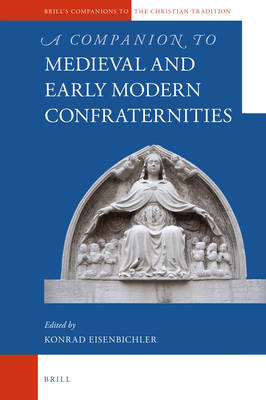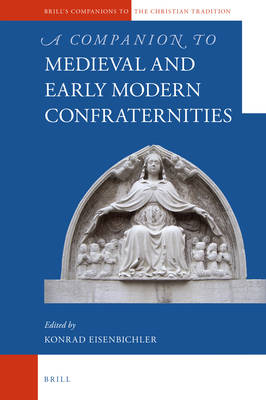
Je cadeautjes zeker op tijd in huis hebben voor de feestdagen? Kom langs in onze winkels en vind het perfecte geschenk!
- Afhalen na 1 uur in een winkel met voorraad
- Gratis thuislevering in België vanaf € 30
- Ruim aanbod met 7 miljoen producten
Je cadeautjes zeker op tijd in huis hebben voor de feestdagen? Kom langs in onze winkels en vind het perfecte geschenk!
- Afhalen na 1 uur in een winkel met voorraad
- Gratis thuislevering in België vanaf € 30
- Ruim aanbod met 7 miljoen producten
Zoeken
A Companion to Medieval and Early Modern Confraternities
€ 406,95
+ 813 punten
Omschrijving
After the State and the Church, the most well organized membership system of medieval and early modern Europe was the confraternity. In cities, towns, and villages it would have been difficult for someone not to be a member of a confraternity, the recipient of its charity, or aware of its presence in the community. In A Companion to Medieval and Early Modern Confraternities, Konrad Eisenbichler brings together an international group of scholars to examine confraternities from various perspectives: their origins and development, their devotional practices, their charitable activities, and their contributions to literature, music, and art. The result is a picture of confraternities as important venues for the acquisition of spiritual riches, material wealth, and social capital.
Contributors to this volume: Alyssa Abraham, Davide Adamoli, Christopher F. Black, Dominika Burdzy, David D'Andrea, Konrad Eisenbichler, Anna Esposito, Federica Francesconi, Marina Gazzini, Jonathan Glixon, Colm Lennon, William R. Levin, Murdo J. MacLeod, Nerida Newbigin, Dylan Reid, Gervase Rosser, Nicholas Terpstra, Paul Trio, Anne-Laure Van Bruaene, Beata Wojciechowska, and Danilo Zardin.
Contributors to this volume: Alyssa Abraham, Davide Adamoli, Christopher F. Black, Dominika Burdzy, David D'Andrea, Konrad Eisenbichler, Anna Esposito, Federica Francesconi, Marina Gazzini, Jonathan Glixon, Colm Lennon, William R. Levin, Murdo J. MacLeod, Nerida Newbigin, Dylan Reid, Gervase Rosser, Nicholas Terpstra, Paul Trio, Anne-Laure Van Bruaene, Beata Wojciechowska, and Danilo Zardin.
Specificaties
Betrokkenen
- Uitgeverij:
Inhoud
- Aantal bladzijden:
- 492
- Taal:
- Engels
- Reeks:
- Reeksnummer:
- nr. 83
Eigenschappen
- Productcode (EAN):
- 9789004343665
- Verschijningsdatum:
- 21/02/2019
- Uitvoering:
- Hardcover
- Formaat:
- Genaaid
- Afmetingen:
- 157 mm x 236 mm
- Gewicht:
- 839 g

Alleen bij Standaard Boekhandel
+ 813 punten op je klantenkaart van Standaard Boekhandel
Beoordelingen
We publiceren alleen reviews die voldoen aan de voorwaarden voor reviews. Bekijk onze voorwaarden voor reviews.








